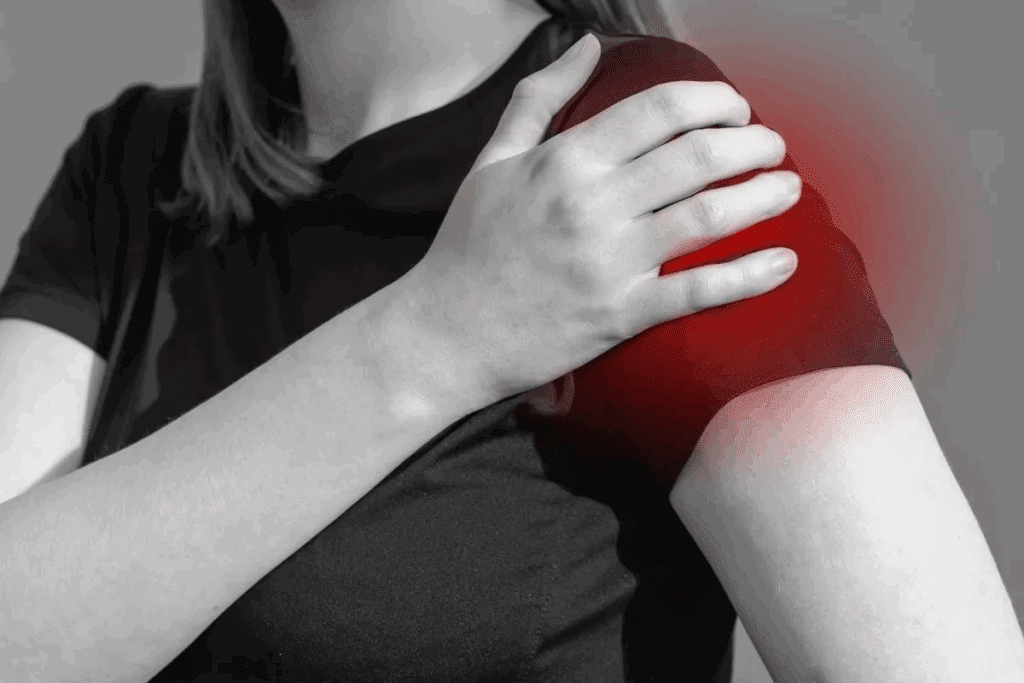Last Updated on November 4, 2025 by mcelik

Tendons are important tissues that link muscles to bones. Injuries to these areas can be hard to heal. A key factor in tendon health is collagen synthesis. This process is where vitamin C is very important.
Studies have found that vitamin C is key for making collagen. Collagen is a main part of tendons. Without enough vitamin C, tendon repair can slow down, making recovery longer.
This article will look at why vitamin C is important for tendon healing. It will also share how this vitamin helps the body fix itself.

Tendons are key to our movement and sports skills. They are strong tissues that link muscles to bones. This is vital for our body’s structure.
Tendons are made of dense tissue with lots of collagen fibers. They help muscles move bones, which is essential for us to move. The health of tendons is key for staying flexible and mobile. They also help absorb shock and stress from activities.
Tendon injuries happen a lot in sports and physical activities. These can be from mild strains to full tears. Tendonitis, or tendon inflammation, often comes from too much use or strain. The shoulders, elbows, knees, and Achilles tendons are usually affected.
Tendonitis is usually from doing the same thing over and over or using a tendon too much. It can also be caused by age, bad training, not warming up or cooling down, and body issues. Getting it treated early is important to avoid more damage and help it heal. Knowing what causes tendonitis helps in managing and preventing it.

Knowing how tendons heal is key to managing injuries and aiding recovery. Tendons link muscles to bones, essential for movement and stability. When injured, they go through a complex healing process in several stages.
The healing of tendons is split into three phases: inflammation, proliferation, and remodeling.
The time for a tendon to heal varies based on several factors. These include the injury’s severity, the person’s health, and the treatment’s effectiveness.
| Factor | Description | Impact on Healing Time |
| Severity of Injury | The extent of the tendon damage. | More severe injuries heal slower. |
| Age and Health | The person’s overall health and age. | Older or those with health issues heal slower. |
| Treatment Plan | The treatment and rehabilitation plan’s effectiveness. | A good plan can shorten healing time. |
A tendon tear, or rupture, is a serious injury needing quick and proper treatment. The healing time for a tendon tear varies based on several factors.
Minor tendon tears might heal in 6-8 weeks with rest and rehabilitation. But, more severe tears can take months to a year or more to fully heal.
Knowing the tendon healing timeline is key to managing your recovery. The healing time changes based on the injury’s type and severity.
The acute phase is the start of tendon healing, filled with inflammation. During this time, the body focuses on stopping bleeding and protecting the injury.
Key events during the acute phase include:
The proliferative phase comes after the acute phase. It’s when new tissue is made. The body starts to rebuild the damaged tendon.
Notable aspects of the proliferative phase:
The remodeling phase is the last stage of tendon healing. It’s when the new tissue is shaped to look like the original tendon.
Key features of the remodeling phase include:
Recovery times differ based on the injury’s type and severity.
| Injury Type | Typical Recovery Time | Factors Influencing Recovery |
| Tendonitis | Several weeks to months | Severity of inflammation, effectiveness of treatment |
| Tendon strains | 2-6 weeks | Grade of strain, rehabilitation protocol |
| Tendon tears | Several months | Size and location of tear, surgical intervention |
Recovery expectations for different injuries show the need for a personalized rehab plan.
Nutrition plays a huge role in tendon health. It helps the body fix tendons. Good nutrition gives the body what it needs to heal tendons well.
Good nutrition is key for fixing tendons. It gives the body the right stuff for healing. Proteins, vitamins, and minerals are important for each step of tendon recovery.
Many nutrients help with tendon recovery. Getting enough of these can improve tendon health and repair.
Vitamin deficiencies can lead to tendonitis. Not having enough Vitamin C and D can hurt tendon health. This can cause tendonitis.
Knowing and fixing these vitamin gaps is key. It helps manage and stop tendonitis.
Vitamin C is key to how tendons heal and get strong again. It’s important for making collagen, a protein that keeps tendons healthy.
Vitamin C helps enzymes called prolyl hydroxylase and lysyl hydroxylase work. These enzymes are needed to make collagen strong and stable. This is important for tendons to be strong and flexible.
If you don’t have enough vitamin C, your tendons won’t be as strong. This makes them more likely to get hurt. So, it’s important to have enough vitamin C for your tendons to heal well.
Collagen is the main protein in tendons. It gives them the strength and flexibility to handle stress. The amount and quality of collagen affects how strong tendons are.
Strong and healthy tendons have well-organized collagen fibers. Vitamin C helps make this happen. It’s vital for fixing tendons after they get hurt.
Vitamin C does more than just help with collagen. It also helps repair other tissues like ligaments. It supports the healing of damaged tendons by making proteins.
Eating foods rich in vitamin C or taking supplements is important. It helps your body heal, which is key for people recovering from tendon injuries.
Finding the right amount of vitamin C for tendon repair is key. Vitamin C helps make collagen, which is vital for tendon health and repair.
The daily vitamin C needs change with age and other factors. For adults, it’s usually 60-90 mg a day. But, this might not be enough for tendon injury recovery.
For tendon repair, you might need more vitamin C than the daily amount. Some research shows 2-3 grams a day can help with collagen and healing.
Even though more vitamin C can help, it’s important to know the limits. The safe upper limit is 2000 mg a day. Taking too much can cause stomach problems like diarrhea and cramps.
To safely use vitamin C for tendon repair, follow these tips:
Knowing the right amount of vitamin C for tendon repair and following safety tips can help your recovery. It can also improve your tendon health.
Vitamin C is key for tendon repair, backed by lots of scientific studies. These studies show vitamin C is vital for tendon healing. It’s a must for anyone recovering from tendon injuries.
Many studies have looked at vitamin C’s effect on tendon healing. A study in the Journal of Orthopaedic Research found vitamin C helps. It boosts collagen production and makes tendons stronger.
Key Findings from Clinical Studies:
Tendonitis, or inflammation of the tendons, can benefit from vitamin C. Studies show vitamin C reduces inflammation and aids in healing.
| Study | Findings | Implications |
| Journal of Orthopaedic Research | Vitamin C enhances collagen synthesis and tendon strength. | Supports vitamin C use in tendon repair. |
| Journal of Nutrition | Vitamin C reduces oxidative stress in tendonitis. | Helps reduce inflammation in tendonitis. |
Experts in orthopedics and sports medicine suggest adding vitamin C to diets for tendon recovery. They recommend 500 mg to 2000 mg daily for best results.
“Vitamin C is essential for collagen and tendon health. Adequate vitamin C intake greatly improves tendon injury recovery.” – An Orthopedic Specialist.
Knowing the science behind vitamin C’s benefits for tendons helps people make better recovery choices. It’s about making informed decisions about nutrition.
For those wanting to help their tendons, knowing about vitamin C supplements is key. Vitamin C helps make collagen, which is important for fixing tendons. Choosing the right vitamin C supplement can be tricky with all the options out there.
Vitamin C supplements come in many forms, each with its own benefits. Here are some of the most common ones:
The success of a vitamin C supplement depends on how well it’s absorbed and used by the body. Liposomal vitamin C is shown to be better absorbed than other forms. Here’s a comparison of how well different forms are absorbed:
| Form of Vitamin C | Absorption Rate |
| Ascorbic Acid | 80-90% |
| Sodium Ascorbate | 85-95% |
| Calcium Ascorbate | 90-98% |
| Liposomal Vitamin C | 95-99% |
When and how you take vitamin C supplements can affect how well they work. It’s best to take them with meals to help your body absorb them better. The amount you should take daily can vary, but 500-1000 mg is often suggested.
It’s a good idea to talk to a healthcare professional before starting any supplement. They can help figure out the best type and amount of vitamin C for you.
There are more than just Vitamin C that help tendons stay healthy and recover. Tendons need many vitamins and minerals to heal and stay strong. We’ll look at how vitamin D, zinc, copper, and B vitamins help tendons.
Vitamin D is key for bone health, but it also helps tendons. Studies show vitamin D receptors in tendon cells, showing its importance. Not having enough vitamin D can lead to tendon pain and problems.
Zinc and copper are important for tendon healing. Zinc helps with protein making and cell growth, which tendons need. Copper helps make collagen, a key tendon part. Together, they help the healing process by starting the right chemical reactions.
Key roles of zinc and copper include:
B vitamins are important for energy and nerve health. They also help with tendon healing. For example, vitamin B6 helps make collagen, which is good for tendons.
“B vitamins play a critical role in keeping tendons healthy by supporting the metabolic processes needed for repair and upkeep.”
Ligaments, like tendons, also need these vitamins and minerals. The nutrients that help tendons also help ligaments. So, vitamins like C, D, zinc, and copper are good for both tendon and ligament health.
Many supplements can help with tendon repair, aside from vitamin C. Tendon recovery is complex. Nutritional supplements can boost the body’s healing.
Collagen supplements are popular for tendon health. Type I collagen is key for tendons. Studies show they can improve tendon structure and function.
A study in the Journal of the International Society of Sports Nutrition found collagen reduced pain in athletes with tendon injuries.
“Collagen hydrolysate supplementation improved symptoms in patients with tendonitis.”
| Type of Collagen | Relevance to Tendons | Efficacy |
| Type I | High | Strong evidence |
| Type II | Moderate | Some evidence |
| Type III | Low | Limited evidence |
Glucosamine and chondroitin are used for joint health. They might also help with tendon recovery. They support connective tissue structure and function.
Benefits:
Omega-3 fatty acids, like EPA and DHA, have strong anti-inflammatory effects. They help reduce inflammation and support tendon healing.
New supplements like curcumin, MSM, and hyaluronic acid are being studied for tendon health. They might offer extra support for recovery.
Key Considerations:
Eating the right foods can help repair and strengthen tendons. A diet rich in nutrients supports healing and reduces injury risk.
Vitamin C is key for collagen, which helps repair tendons. Add citrus fruits like oranges and grapefruits, berries such as strawberries and kiwis, and leafy greens like spinach to your meals. These boost vitamin C levels.
Other good sources include broccoli, bell peppers, and tomatoes. They help tendons and offer nutritional benefits too.
Protein is essential for tendon repair. Include lean meats like chicken and turkey, fish rich in omega-3 fatty acids such as salmon, and eggs in your meals. Plant-based options like legumes, beans, and lentils are also great for protein.
Inflammation can slow down tendon healing. Eating anti-inflammatory foods like turmeric and ginger can help. Other good foods include fatty fish, walnuts, and olive oil.
Plan meals with vitamin C-rich foods, protein, and anti-inflammatory foods. For example, a salad with spinach, grilled chicken, and sliced oranges is nutritious and good for tendons.
Drinking plenty of water is also key for tendon health. It keeps tendons hydrated and aids in healing.
Physical methods can greatly improve vitamin therapy for tendon repair. Vitamins give the nutrients needed for healing. Physical methods help create the best environment for recovery.
Icing is a common way to manage pain and swelling in tendon injuries. Applying ice to the area can reduce swelling and pain. It’s key in the early stages of recovery.
The benefits of icing include:
Finding the right mix of rest and movement is vital for tendon healing. Rest is needed to avoid further injury. But too much rest can make tendons stiff and weak.
A balanced approach involves:
Several complementary therapies can help with tendon healing when used with vitamin therapy. These include:
By combining these physical methods with vitamin therapy, people can create a full treatment plan. This plan addresses all aspects of tendon healing.
Healing tendons needs a full plan. This includes taking vitamin C, eating right, and doing physical therapy. Knowing how vitamin C helps with collagen and tendon repair is key to getting better.
Eating foods high in vitamin C and other important nutrients like vitamin D, zinc, and omega-3s helps tendons heal. Adding physical therapy, like moving carefully and icing, can also help a lot.
Putting all these together makes a great way to heal tendons. This approach not only speeds up healing but also keeps you from getting hurt again. It makes your muscles and bones stronger and healthier.
Healing time for tendon tears varies. It depends on the injury’s severity and individual factors. It can take weeks to months to heal.
Tendon healing has three phases. The acute phase lasts 0-7 days. The proliferative phase is 1-6 weeks. The remodeling phase goes from 6 weeks to 1 year.
The right amount of vitamin C for tendon repair can differ. But, doses from 500 to 2000 mg daily might help with recovery.
There are various vitamin C supplements like ascorbic acid and sodium ascorbate. Their absorption rates and bioavailability differ.
Yes, vitamins like vitamin D and minerals like zinc and copper are also important. They help in tendon repair and recovery.
Foods high in vitamin C, like citrus fruits, and leafy greens are good. Also, lean meats, fish, and omega-3 rich foods support tendon healing.
Physical methods like icing and rest help. Movement and complementary therapies also enhance healing and support vitamin therapy.
Yes, not having enough vitamins, like vitamin C, can lead to tendonitis and poor tendon health.
Collagen is vital for tendons. Its production is key for tendon strength and recovery. Vitamin C helps in making collagen.
Yes, there are supplements like collagen and omega-3 fatty acids. They can help in tendon recovery and health.
Subscribe to our e-newsletter to stay informed about the latest innovations in the world of health and exclusive offers!